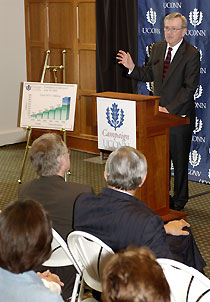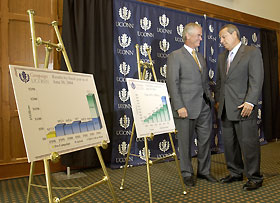For more archives, go to the Advance Archive/Search Page.
Capital Campaign Concludes, $471 Million Raised
Campaign UConn, the largest private fund-raising effort ever conducted by a public university in New England, exceeded its $300 million goal by $171.1 million, the University of Connecticut Foundation Inc. announced Aug. 11. The Campaign ended June 30.
The $471.1 million total includes the in-kind gift of engineering software from UGS PLM Solutions, a subsidiary of EDS, with a commercial value of $146.1 million - the largest gift ever received by the University.
 |
President Philip E. Austin speaks during a press conference August 11 to
announce the successful completion of the University's capital campaign.
Campaign UConn exceeded its $300 million goal by $171.1 million.
|
 |
Denis Nayden, left, and John Martin, president of the UConn Foundation, speak after a press conference announcing the successful completion of Campaign UConn. |
The gifts and pledges collected during the six-year campaign will support students, faculty, and programs. Of the 115,000 individuals, corporations, charitable foundations, and other organizations that made nearly 323,000 gifts and pledges during the Campaign, more than 61,000 were first-time donors.
The UConn Foundation also reported that fiscal year 2004 was the most successful single year of fund-raising in the University's history. During the year, which ended June 30, in addition to the $146.1 million in-kind gift, the University raised $75 million, besting the previous high of $57 million raised in 2001. The Annual Fund also surpassed its goal of $2.5 million, and investment returns earned 16.5 percent.
"Every campus, every school, and every college at UConn benefits from the Campaign," said University President Philip E. Austin.
"What allows us to aspire to excellence is the private support we receive from individuals, corporations, and foundations who invest in UConn," Austin added. "Their commitment to our academic programs allows us to continue to recruit the best faculty in the country, who come to conduct research and provide the instruction that will ultimately attract the very best students. That's what this Campaign was all about - investing in the future of our University, our people, the state, and the nation."
John K. Martin, president of the Foundation, said that the Campaign, which was launched in 1998 with a 'silent phase,' was successful in part because the state legislature provided donors with a tremendous incentive - funds to match their gifts to endowment.
"The state matching gift program became the cornerstone for a new era of philanthropy at UConn," Martin said, noting that the matching program continues for gifts to endowment received through 2012.
Of the donations received, $37.5 million has been designated primarily for scholarships, $45.3 for faculty support, and $388.3 for program enhancements and some building projects not covered by UConn 2000 or 21st Century UConn.
"The leadership provided at the University and Foundation board level, coupled with the help of a strong and committed corps of volunteers, was integral to the Campaign's success," said Denis M. Nayden, chair of the Campaign UConn steering committee, managing partner for Oak Hill Management, and the former chairman and CEO of GE Capital Corp. "Campaign UConn may have concluded, but it has set the stage and built a foundation for beginning a new age at the University."
The impact of the Campaign can be measured by the 415 new endowments established. Of these, 253 are for student scholarships, fellowships, and awards; 37 for faculty, including 17 endowed chairs and 8 professorships; and 125 for program support. The total number of endowments now stands at 1,016: 629 for student support; 95 for faculty support; and 292 for program support.
In addition, the Campaign more than doubled the University's endowment from $123 million in 1998 to $250 million.
"UConn cannot and will not rest on these accomplishments. To be among the best public universities in the nation, which have billion dollar endowments, we must continue to build our endowment in order to recruit and retain the best faculty and students," said Martin, the Foundation president.
Dr. John W. Rowe, chairman and CEO of Aetna, and chair of the University's Board of Trustees, said, "One of the questions people ask is, 'Why does a public university need private fund raising, particularly at a time when the state has been so incredibly generous to the University?' It is very clear that private funds tremendously supplement and leverage public funds. It's the icing on the cake."
The largest gift to the Campaign by an individual was from Ray Neag, '56, who pledged a total of $23 million: $21 million in support of the Neag School of Education and $2 million to endow the Ray Neag Distinguished Chair in Vascular Biology at the Health Center. As announced earlier this month (see story p. 1), Neag and his wife Carole have made an additional post-campaign commitment of $10 million to name and support the Carole and Ray Neag Comprehensive Cancer Center at the UConn Health Center.
Dr. Bruce T. Liang, who holds the Ray Neag Distinguished Chair in Vascular Biology and is chairman of the Pat and Jim Calhoun Cardiology Center, said he has been "helped immeasurably by the financial resources that the Neag endowed chair affords me. Through ever more robust research and clinical training opportunities, we are attracting more and more top-quality students, post-docs, and interns."
Dobrowolsky Day of Pride Scholarship recipient Melissa Paul, '06, said the scholarship she received gives her a chance to get an education that she otherwise could not afford. Paul is a fifth-semester music education major.
"We who receive the wonderful gift of education through the generosity of others know what kind of impact it can have on an individual's life," Paul said. "I know that I am already motivated to give back when I leave the University so that others can have similar experiences."
UConn's only previous fund-raising campaign was the $25 million Second Century Fund, conducted between 1982 and 1987. The campaign concluded successfully, raising more than $55 million to support students, faculty and programs.
The University of Connecticut Foundation Inc. is a private, non-profit corporation that solicits, receives, and administers gifts and financial resources from private sources for the benefit of all campuses and programs of the University of Connecticut. Housed in its own building on the Storrs campus, the Foundation has grown from six staff members in 1995 to nearly 80 full-time development professionals.

